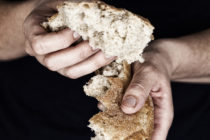Published in the Episcopal New Yorker (Winter 2013) with illustration, page 5
Mother Mary as Mom: Hints in the Gospels on How Mary Parented Jesus
by the Rev. Rhonda J. Rubinson
There are precious few interactions between Jesus and his biological family recorded in the Gospels, and the ones that we do have are generally marked by an odd tinge of hostility. This is true even of Jesus’ few recorded exchanges with his mother Mary. Apart from the tender effort that Jesus makes to assure that his mother is cared for after his death as he hangs on the cross (Jn. 19:26-27), the rest of Jesus’ interactions with Mary are strange at the least; a few can even be considered harsh.
I’ve always felt that the harshest was Jesus’ comeback to Mary at the wedding at Cana (Jn. 2:1-11). In response to what seems like an innocent remark that Mary makes to Jesus (“They’ve run out of wine”), Jesus snaps back, “Woman, what concern is that to you and to me? My hour has not yet come.” Even taking into account the implication in Mary’s statement that their family is somehow responsible for the wedding’s wine supply, that’s a rather sharp answer, at a public gathering no less. What’s more, the sharp tone seems to come from nowhere – that is, unless there’s some deep mother-son history here.
There’s a strong hint to that history in Luke (2:41-52), where the twelve-year-old Jesus remains in Jerusalem after the Passover festival, and Mary and Joseph unknowingly leave without him. After searching through the crowd and not finding him, they head back to Jerusalem, where three days later they find him teaching in the temple. Mary, as usual, does the talking, chiding him for aggravating his parents (“Child, why have you treated us like this? Look, your father and I have been searching for you with great anxiety”). Jesus makes his case to his parents to be allowed to act as though he were of sufficient age to make his own decisions (“Why are you searching for me? Did you not know that I must be about my father’s business?”), rather like any adolescent boy announcing to his parents that he no longer wanted to live by their rules.
Although clearly an amazingly precocious teacher, Jesus does not prevail against his mother: Luke says that he goes home to Nazareth with his parents and is “obedient to them.” His parents – with Mary obviously in the lead – have asserted parental authority, and Jesus submits. Then Luke falls silent on what follows this episode, but it is possible to imagine further dialogue between Jesus and Mary that goes unrecorded as the family heads home, Mary saying to Jesus, “My son, be patient. Your hour has not yet come.”
We don’t hear another word about what Jesus says or does for another 18 years. During that time, though, we can imagine Jesus trying to “be about his father’s business” again and again, and Mary’s stock answer becoming a repeated irritant to the eager young Jesus: “My son, be patient. Your hour has not yet come.”
When Jesus’ hour does come he is at the wedding at Cana, and it is Mary who finally gives permission for him to “get about his father’s business.” As not only the Mother of God, but simply as her son’s mom, it was Mary who held Jesus back when he was too young to begin his ministry, and it is she who kicks him out of the nest when he is ready. When Mary challenges Jesus to solve the wine problem at the wedding (that is, perform his first public miracle), Jesus shoots back the answer his mother always gave him – “Woman, what do you want with me? My hour is not yet come.”
But now Jesus’ hour finally had come. And Mary, the Mom of God, knew it, even if her son did not.
And Jesus finally got to get about his father’s business.




